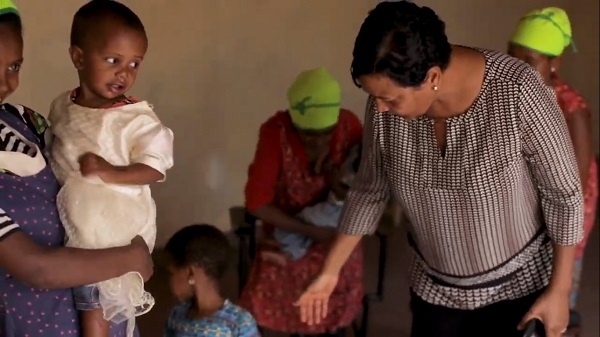
CNN has revealed the Top 10 CNN Heroes of 2019–10 men and women who are making the world a better place by helping families affected by tragedy, cleaning up the environment, protecting neglected animals, and so much more. Ethiopian Freweini Mebrahtu is included in this Top 10 CNN Heroes list for her superb and relentless effort to remove the cultural stigma around women’s periods in Ethiopia.
Her cause:
Menstruation is considered taboo in Ethiopia, and girls often miss school or drop out because of their periods. So, in 2005, Freweini Mebrahtu designed and patented a reusable menstrual pad. Today, she and her team produce 750,000 pads a year at her Mariam Seba Sanitary Products Factory, named for her daughter. Freweini* works in partnership with the nonprofit Dignity Period, which has conducted educational workshops for more than 300,000 students, teaching girls and boys that menstruation is natural, not shameful. Freweini speaks at these events occasionally and enjoys seeing thousands of students receiving this message.
What inspired her:
When Freweini Mebrahtu got her period at age 13, she panicked. “I remembered (hearing) that it’s actually a curse to have a period,” she said. “Or that it meant I am ready to be married, or (that) I’m being bad.”
Like most girls in northern Ethiopia, she suffered in silence, never mentioning it to her mother or sisters. With no access to sanitary products, she coped by using rags. “One time I had an accident in class and I was so scared and ashamed,” she said. “Even today I remember how I felt.”
Freweini went on to study in the United States, and remembers her first trip to an American drugstore.
“I saw overwhelming choices of sanitary pads,” she said. “I started thinking … ‘What about the girls that I left behind?’“
More about Freweini Mebrahtu and her work
When Freweini Mebrahtu got her period at age 13, she panicked.
“I was terrified,” she said. “And I remembered (hearing) that it’s actually a curse to have a period … or that it meant I am ready to be married, or (that) I’m being bad.”
Like most girls in northern Ethiopia, she suffered in silence, never mentioning it to her mother or sisters. With no access to sanitary products, she coped by using rags.
“One time I had an accident in class and I was so scared and ashamed,” said Freweini, now 54. “Even today I remember how I felt.”
Freweini went on to study chemical engineering in the United States. She still remembers her first trip to an American drugstore in 1983.
“I saw overwhelming choices of sanitary pads,” she said. “I started thinking … ‘What about the girls that I left behind?’“
In Ethiopia — and many other parts of the world — menstruation is still considered taboo. According to UNICEF, the subject is generally not taught in schools and most girls never discuss it with another person. Disposable sanitary products are very expensive and often unavailable, so nearly 75% of Ethiopian women and girls don’t have access to the menstrual supplies they need to manage their periods.
The situation has serious consequences. On average, one in 10 girls in Ethiopia miss school for reasons related to their periods; in some rural areas, this increases almost 50%. Missing school can lead girls to fall behind in class and eventually drop out.
Freweini believes no girl should miss school because of her period.
In 2005, she designed and patented a reusable menstrual pad. Today, she and her team produce 750,000 pads a year at her Mariam Seba Sanitary Products Factory, named for her daughter.
Since 2009, nearly 800,000 girls and women have benefited from her work.
